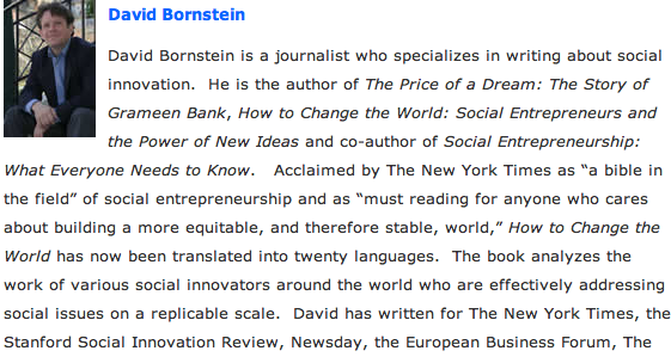Just a little over a year ago, I was a confused freshman wandering around Marquette with no idea what to do with my present or my future. During that first semester, I took a 75 minute class once a week called How to Change the World, named after our textbook, which was written by David Bornstein.
That class, which was my honors college seminar, was taught by Jeff Snell, a special assistant to the president's office who has essentially brought social entrepreneurship to Marquette. Jeff always gave an intriguing lecture, and the projects he had us do showcased our skills and his passion for the field.
When I saw the poster for Bornstein's speech last week, I immediately flashed back to that class. Ten smart, eager freshmen sitting in a classroom, listening to a genius in his field talk to us about the impact we can all have on the world around us. The class, needless to say, provided an incredible opportunity.
What Bornstein's speech provided was nostalgia and closure. I got to think back to a great moment of my freshman year and also confirm some of the things that I learned in the class. The lecture was like a capstone moment nine months after the class ended.
The speech itself illuminated a problem with journalism that I hadn't thought about before. Bornstein preached "solutions journalism," his way of writing about solutions to problems, not just about the problems themselves. This is a problem that goes overlooked by many in the profession. Columns aren't just for whining about the world's issues, but they also provide a unique outlet for providing innovative solutions to those problems.
Overall, Bornstein drew me back to one of the most interesting parts of my freshman year, and also brought me forward, by suggesting a solution to a common journalistic problem, that of a lack of solutions.
That class, which was my honors college seminar, was taught by Jeff Snell, a special assistant to the president's office who has essentially brought social entrepreneurship to Marquette. Jeff always gave an intriguing lecture, and the projects he had us do showcased our skills and his passion for the field.
When I saw the poster for Bornstein's speech last week, I immediately flashed back to that class. Ten smart, eager freshmen sitting in a classroom, listening to a genius in his field talk to us about the impact we can all have on the world around us. The class, needless to say, provided an incredible opportunity.
What Bornstein's speech provided was nostalgia and closure. I got to think back to a great moment of my freshman year and also confirm some of the things that I learned in the class. The lecture was like a capstone moment nine months after the class ended.
The speech itself illuminated a problem with journalism that I hadn't thought about before. Bornstein preached "solutions journalism," his way of writing about solutions to problems, not just about the problems themselves. This is a problem that goes overlooked by many in the profession. Columns aren't just for whining about the world's issues, but they also provide a unique outlet for providing innovative solutions to those problems.
Overall, Bornstein drew me back to one of the most interesting parts of my freshman year, and also brought me forward, by suggesting a solution to a common journalistic problem, that of a lack of solutions.
People love problem solving. It's a shame that journalism hasn't written more about problem solving. - @dnbornstein #loweclass #muethics
— Michael LoCicero (@michaellocicero) September 18, 2012
"Every problem leads to its own set of responses," - @dnborstein says as he draws comparison to Newton's laws. #loweclass #muethics
— Christopher Chavez (@Chris_J_Chavez) September 18, 2012

 RSS Feed
RSS Feed